人教版八年级英语下Unit2 单元知识点总结
完整版)人教版八年级英语下册第二单元知识点归纳总结

完整版)人教版八年级英语下册第二单元知识点归纳总结Unit 2: I'll Help Clean Up the City ParksIn our community。
we have many beautiful parks that we can enjoy。
However。
sometimes people leave trash and litter behind。
which can make the parks look messy and uninviting。
That's why I'm excited to help clean up the city parks with my friends。
We plan to set up a le and make a plan to clean up different parks each week。
We'll gather our XXX each other up as we work to make a difference in our community。
We'll also give out flyers and talk to people in the community to encourage them to help keep the parks clean。
We believe that if we all work together。
we can make it possible for everyone to enjoy the parks in a clean and safe environment。
I used to think that one person couldn't make a difference。
but I've XXX caring for our community。
人教版Go for it!八年级下册英语各单元知识点总结

人教版Go for it!八年级下册英语各单元知识点总结Unit 1 What’s the matter?重点:1、态动词should & shouldn’t 的用法;2、have + 疾病;3. 反身代词的用法。
难点:能询问并表述身体的种.种不适以及对他人身体的种.种不适给予适当的建议。
知识点:What’s the matter? 怎么了? What’s the matter with you? = What’s the trouble with you? = What’s wrong with you? 你怎么了?have a cold = catch a cold 感冒have a stomachache 胃痛have a sore + 部位……痛lie down 躺下take one’s temperature 量体温have a fever 发烧have a cough 咳嗽take breaks 休息get an X-ray 拍X光片away from 远离on the side of the road 在马路边shout for help 大声呼救get off 下车to one’s surprise 出乎某人意料thanks to 多亏;由于in time 及时right away 马上,立即get into 陷入get into trouble 陷入困境have a toothache 牙痛put one’s head down 低头have a nosebleed 流鼻血put a bandage on sth. 用绷带包扎get hit on the head 砸到头(注意v.+ on the + 身体部位的表达方达) be interested in 对……感兴趣There were many times when …(when 引导的定语从句)be used to doing sth. 习惯做某事take risks 冒险because of 因为in …situation 处于……境地run out 用光get out of 逃离of importance = important (of + n. = adj.) be in control of 管理make a decision 做决定give up 放弃Unit 2 I’ll help to clean up the city parks.重点&难点:1、不定式作宾语、状语和宾补的用法;2、could表建议时的用法;3、掌握短语:run out of, take after, fix up, give away等;4. 学会用will 和would like表达意愿。
人教版英语八下Unit2_单元要点梳理总结
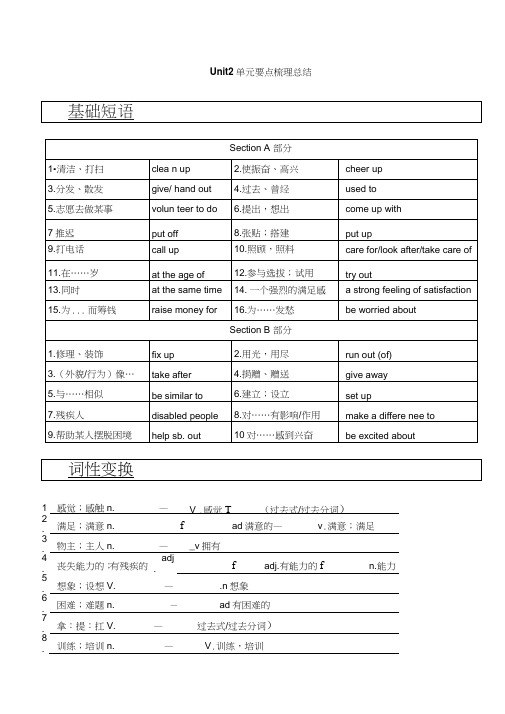
Unit2单元要点梳理总结9. 仁慈;善良n. _________ - ______ a dj.友好的,善良的10. 理解;领会v. ________ -____________ 去式/过去分词)11. 兴趣n. ________ 使感兴趣;使关注v. ____________ —__________ adj.感兴趣的—__________ a dj.有趣的重知回顾1. You couldhelpto clean upthe city parks.(1)①help sb. with sth.帮助某人某事翻译:你能在家庭作业方面帮助我吗?___________________________________② help sb. (to) do sth.帮助某人做某事翻译:他常常帮助他妈妈做家务。
_______________________________________⑵clean up意为打扫干净”翻译:Nancy, please clean up your room. ______________________________2. The girl could visit the sick kids in the hospital toheer them upcheer up意为使开心,使振作、振奋”,代词用作宾语时,要当在cheer和up之间。
翻译:Cheer up! Everything will be OK. _________________________________3. The boy couldgive outfood at the food bank.give out意为分发、散发”,相当于hand out。
翻译:这有一些书。
请把它们分发给同学们。
4. The girl could volunteerin an after-school study program to teach kids.volunteer用作动词,表示义务做、自愿做”,后接不定式作宾语,volunteer to do sth.志“ 愿做某事”;作名词,表示志愿者”,为可数名词。
八下英语第二单元重点
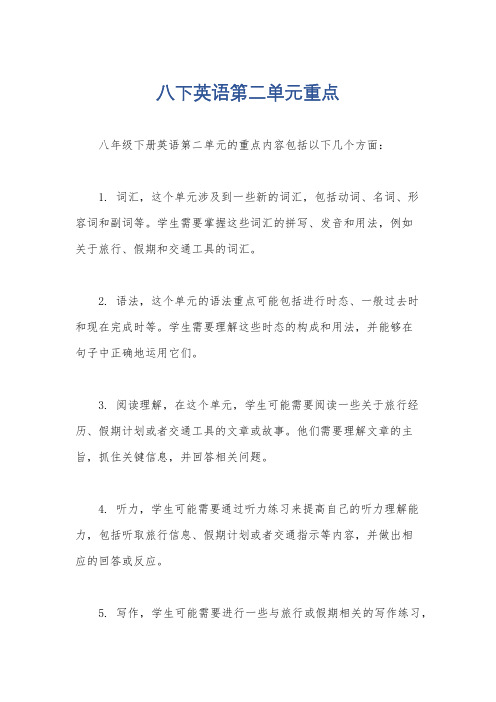
八下英语第二单元重点
八年级下册英语第二单元的重点内容包括以下几个方面:
1. 词汇,这个单元涉及到一些新的词汇,包括动词、名词、形
容词和副词等。
学生需要掌握这些词汇的拼写、发音和用法,例如
关于旅行、假期和交通工具的词汇。
2. 语法,这个单元的语法重点可能包括进行时态、一般过去时
和现在完成时等。
学生需要理解这些时态的构成和用法,并能够在
句子中正确地运用它们。
3. 阅读理解,在这个单元,学生可能需要阅读一些关于旅行经历、假期计划或者交通工具的文章或故事。
他们需要理解文章的主旨,抓住关键信息,并回答相关问题。
4. 听力,学生可能需要通过听力练习来提高自己的听力理解能力,包括听取旅行信息、假期计划或者交通指示等内容,并做出相
应的回答或反应。
5. 写作,学生可能需要进行一些与旅行或假期相关的写作练习,
比如写一篇关于自己假期计划的短文或者写一封给朋友的电子邮件,分享旅行经历。
总的来说,这个单元的重点是让学生掌握与旅行、假期和交通
工具相关的词汇、语法和表达能力,培养他们的阅读理解和听力理
解能力,同时提高他们的写作能力。
希望这些内容能够帮助你更好
地理解这个单元的重点。
Unit 2 单元知识点复习 2022-2023学年人教版英语八年级下册

人教版英语八年级下册第二单元知识点过关Unit 2 I ’ll help to clean up the city parks.一、重点短语1. Clean-Up Day 清洁日、大扫除2. an old people’s home 一家养老院3. help out with sth. 帮助解决困难;例如:What did they ask you to help out with他们叫你帮忙做什么?ed to 曾经…、过去;例如:I used to be a shy girl . 我过去是个害羞的女孩儿。
5.care for 关心、照顾;例如:Every year , the volunteers spend two months caring for the old in the old people’s home. 每年,志愿者们花两个月时间去养老院照顾老人。
6. the look of joy 快乐的表情;例如:The teacher was happy to see the look of joyon her students’ faces. 老师很高兴看到学生们脸上快乐的表情。
7. at the age of 在......岁时;例如:The little boy could dress himself at the age of three. 这个小男孩在三岁的时候就可以自己穿衣服了。
8.clean up 打扫(或清除)干净9. cheer up (使)变得更高兴;例如:Don’t be sad , cheer up , life is full of sunshine.不要悲伤了,高兴起来吧,生活充满了阳光。
10. give out 分发、散发,同义词hand out11. come up with 想出、提出;例如:The clever boy can always comes up some good ideas. 这个聪敏的男孩儿总能想出一些好主意。
人教版八年级英语下册各单元知识点总结完整版

Unit 1 What’s the matter?一、重点短语1. have a fever 发烧2. have a cough 咳嗽3. have a toothache 牙疼4. talk too much 说得太多5. drink enough water 喝足够的水6. have a cold 受凉;感冒7. have a stomachache 胃疼8. have a sore back 背疼9. have a sore throat 喉咙痛10. lie down and rest躺下来休息11. hot tea with honey加蜂蜜的热茶12. see a dentist看牙医13. get an X-ray拍X光片14. take one’ s temperature量体温15. put some medicine on sth在……上面敷药16. feel very hot 感到很热17. sound like 听起来像18. all weekend 整个周末19. in the same way以同样的方式20. go to a doctor 看医生21. go along 沿着……走22. on the side of the road 在马路边23. shout for help 大声呼救24. without thinking twice 没有多想25. get off 下车26. have a heart problem 有心脏病27. to one’ s surprise 使……惊讶的28. thanks to 多亏了;由于29. in time及时30. save a life 挽救生命31. get into trouble 造成麻烦32. right away 立刻;马上33. because of 由于34. get out of 离开35. hurt oneself 受伤36. put a bandage on sth. 用绷带包扎37. fall down 摔倒38. feel sick 感到恶心39. have a nosebleed 流鼻血40. cut his knee割伤他的膝盖41. put her head back 把她的头向后仰42.have problems breathing呼吸困难43. mountain climbing登山运动44. be used to doing sth. 习惯做某事45. run out (of) 用完;用尽46. so that 以便47. so…that 如此……以至于……48. be in control of 掌管;管理49. in a difficult situation 在逆境屮50. keep on doing sth.坚持做某事51. make a decision做出决定52. take risks 冒险53. give up 放弃二、知识点解析1. What’s the matter? 怎么了?若是询问“某人怎么了?”要用“What’s the matter with sb.?”拓展:What’s the matter with sb.? 的同义句:What’s wrong with sb.? / What’s the trouble with sb.?2.疾病类短语:have a +疾病. e.g. :have a fever 发烧have a cold 感冒have a cough 咳嗽.have a +身体部位-ache. e.g.: have a headache 头痛have a toothache 牙痛.have a sore+身体部位. e.g.: have a sore throat咽喉痛have a sore back背痛例题:Mom, I____________.I’m sorry to hear that, dear. We must go to see the dentist right away.A. have a headacheB. have a stomachacheC. have a toothacheD. have a fever3. lie down 躺下V. 躺,平躺。
八下英语二单元知识点

八下英语二单元知识点八年级下册英语第二单元主要围绕着“日常活动”这一主题展开,涉及了学生们在学校和家中进行的各种活动,包括学习、运动、娱乐等。
以下是本单元的重点知识点详解,帮助同学们更好地掌握和运用所学知识。
一、重点词汇日常活动类词汇:study(学习)、play(玩耍)、eat(吃)、sleep(睡觉)、wash(洗漱)、shop (购物)等。
学校生活相关词汇:class(课程)、homework(作业)、test(考试)、library(图书馆)、playground (操场)等。
运动类词汇:swim(游泳)、play tennis(打网球)、ride a bike(骑自行车)、climb mountains (爬山)等。
频度副词:always(总是)、usually(通常)、often(经常)、sometimes(有时)、never(从不)等。
二、重点短语日常活动短语:go to the movies(去看电影)、go shopping(去购物)、play computer games (玩电脑游戏)、do housework(做家务)等。
学校生活短语:have a test(参加考试)、go to the library(去图书馆)、play sports(做运动)、after-school activities(课后活动)等。
运动类短语:play tennis with sb.(和某人一起打网球)、go swimming(去游泳)、ride a bike to school(骑自行车上学)等。
三、重点句型询问某人通常做什么活动的句型:What do you usually do on weekends? 你周末通常做什么?描述某人一周内活动安排的句型:On Monday, I usually ... 周一我通常……;On the weekend, I sometimes ... 周末我有时……使用频度副词谈论日常活动的句型:I always get up at 6:30 in the morning. 我总是早上6:30起床。
人教版八年级下册英语Unit 2知识点汇总

人教版八年级下册英语Unit 2知识点汇总一、常考短语clean up 打扫(或清除)干净cheer up(使)变得更高兴;振奋起来give out 分发;散发come up with 想出提出(主意、计划、回答等)put off 推迟hand out 分发call up 打电话给(某人);征召used to曾经……“;过去…care for照顾;非常喜欢try out参加………选拔;试用fix up修理;装饰give away赠送;捐赠take after(外貌或行为)像set up 建起;设立make a difference 影响;有作用put up 张贴;搭建;举起help out 帮助……摆脱困境give up 放弃come true 实现run out of 用尽;耗尽be similar to 与………相似volunteer to do sth 自愿做某事make plans to do sth 制订计划做某事ask sb (not) to do sth 要求某人(不要)做某事used to do sth 过去常常做某事give up+时间+to do sth腾出时间做某事get a feeling of 产生…的感觉decide to do sth 决定做某事help sb (to) do sth帮助某人做某事make a difference to对…产生影响make it possible for sb to do sth使得做某事对某人来说成为可能三、经典句型1.You could help to clean up the city parks. A(9)你可以帮助打扫城市公园。
(1)could意为“能;可以”,其后接动词原形,可以用于提出建议,语气比can委婉。
You could walk to the park.你可以步行去公园。
拓展:could表示过去的能力时,是can的过去式。
人教版英语八年级下册单元Unit 2 知识点+测试卷+思维导图
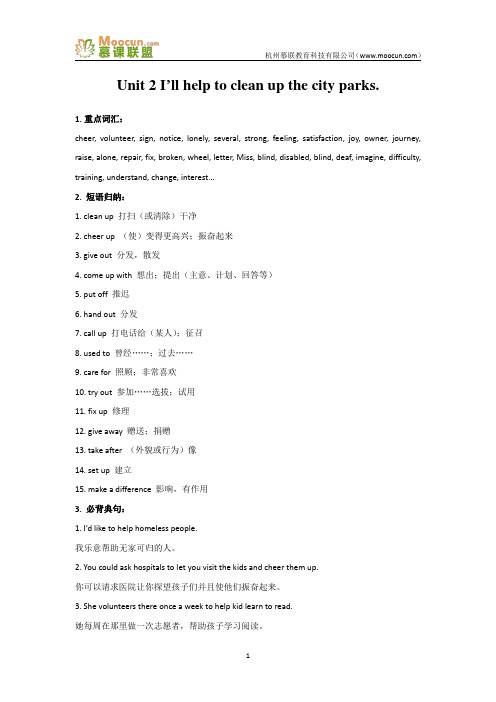
Unit 2 I’ll help to clean up the city parks.1.重点词汇:cheer, volunteer, sign, notice, lonely, several, strong, feeling, satisfaction, joy, owner, journey, raise, alone, repair, fix, broken, wheel, letter, Miss, blind, disabled, blind, deaf, imagine, difficulty, training, understand, change, interest...2. 短语归纳:1. clean up 打扫(或清除)干净2. cheer up (使)变得更高兴;振奋起来3. give out 分发,散发4. come up with 想出;提出(主意、计划、回答等)5. put off 推迟6. hand out 分发7. call up 打电话给(某人);征召8. used to 曾经……;过去……9. care for 照顾;非常喜欢10. try out 参加……选拔;试用11. fix up 修理12. give away 赠送;捐赠13. take after (外貌或行为)像14. set up 建立15. make a difference 影响,有作用3. 必背典句:1. I’d like to help homeless people.我乐意帮助无家可归的人。
2. You could ask hospitals to let you visit the kids and cheer them up.你可以请求医院让你探望孩子们并且使他们振奋起来。
3. She volunteers there once a week to help kid learn to read.她每周在那里做一次志愿者,帮助孩子学习阅读。
八年级下册人教版英语第二单元2d知识点

八年级下册人教版英语第二单元2d知识点英语作为一门重要的外语,在我们的学习生活中扮演了重要的角色。
对于初中生来说,学习英语是日常学习的重点之一。
八年级下册人教版英语第二单元2d知识点也是我们学习中的重头戏,掌握这些知识点对于我们的英语学习是至关重要的。
在本文中,我将和大家一起学习八年级下册人教版英语第二单元2d知识点,希望能对大家的英语学习有所帮助。
一、过去完成时的用法过去完成时表示在过去某个时间或动作之前已经发生了另一个动作或存在了一个状态。
它的结构是“had + 过去分词”,例如:“I had finished my homework before I went to bed.”二、虚拟语气的用法虚拟语气是表示一种假设、虚构或不可能实现的情况。
它的常用结构是:“if + 过去式,would/could/should + 动词原形;现在将来式”,例如:“If I had enough money, I would buy a car.”三、倒装语序英语中有很多种倒装语序,通常情况下是为了加强语气或者使语句更加清晰易懂。
例如:“Not only did he study En glish, but he also learned French.”四、固定搭配的用法英语中存在大量的固定搭配,掌握这些固定搭配对于我们的英语学习是非常有帮助的。
例如:“make friends”、“take part in”等。
五、情态动词的用法情态动词通常表示说话者的态度、意图、能力、推测等,它们有“can, could, may, might, must, shall, should, will, would”等。
例如:“I can swim very well.”总之,八年级下册人教版英语第二单元2d知识点是我们英语学习中的重点之一。
要想掌握这些知识点,我们需要抓住重点,勤加练习,多听多读多记多练,相信我们的英语水平一定会不断提高。
人教版八年级下册英语Unit 2单元语法知识点总结

人教版八年级下册英语Unit 2单元语法知识点总结本单元重点短语的具体用法1. clean up:打扫(或清除)干净- We need to clean up the classroom before the teacher comes. 我们需要在老师来之前把教室打扫干净。
2. cheer up:(使)变得更高兴;振奋起来- Let's cheer up and look forward to the future. 让我们振作起来,展望未来。
3. give out:分发;散发- The volunteers are giving out food to the homeless. 志愿者们正在向无家可归者分发食物。
4. come up with:想出;提出(主意、计划、回答等)- She came up with a great idea to solve the problem. 她想出了一个很好的解决问题的主意。
5. put off:推迟- We had to put off the meeting because of the bad weather. 由于天气恶劣,我们不得不推迟会议。
6. hand out:分发- The teacher asked me to hand out the papers. 老师让我分发试卷。
7. call up:打电话给(某人);征召- I need to call up my friend to discuss the project. 我需要给我的朋友打电话讨论这个项目。
8. used to:曾经……;过去…- He used to be a teacher, but now he works in a company. 他过去是一名老师,但现在在一家公司工作。
9. care for:照顾;非常喜欢- She cares for her elderly parents very much. 她非常照顾她的年迈父母。
英语八年级下册unti2知识点
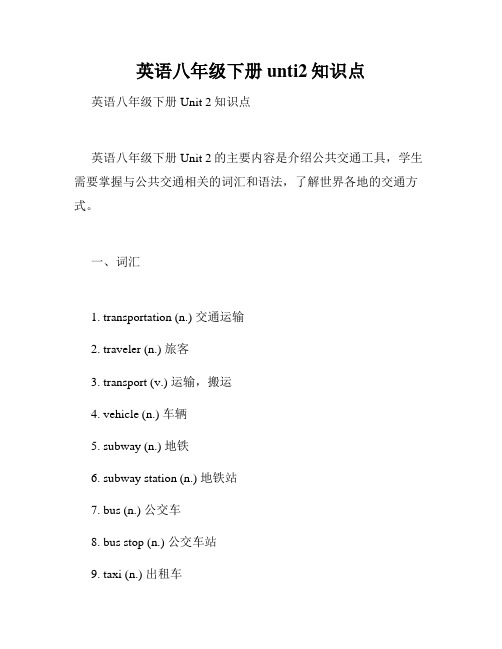
英语八年级下册unti2知识点英语八年级下册Unit 2知识点英语八年级下册Unit 2的主要内容是介绍公共交通工具,学生需要掌握与公共交通相关的词汇和语法,了解世界各地的交通方式。
一、词汇1. transportation (n.) 交通运输2. traveler (n.) 旅客3. transport (v.) 运输,搬运4. vehicle (n.) 车辆5. subway (n.) 地铁6. subway station (n.) 地铁站7. bus (n.) 公交车8. bus stop (n.) 公交车站9. taxi (n.) 出租车10. bridge (n.) 桥11. intersection (n.) 十字路口12. pedestrian (n.) 行人13. traffic light (n.) 交通灯14. highway (n.) 高速公路15. tram (n.) 有轨电车二、语法1. 现在进行时现在进行时用来描述正在进行的动作或状态,结构为 be + 动词+ ing,例如:I am taking the subway to work. 我正在坐地铁去上班。
They are walking to the bus stop. 他们正在步行去公交车站。
2. 一般现在时一般现在时用来描述经常性或习惯性的动作或状态,结构为主语+动词原形,例如:She usually takes the bus to school. 她通常乘公交车去上学。
The traffic light turns red. 交通灯变为红色。
3. 介词 in 和 on 的用法in 用来表示在某个范围之内,例如在一年中的某个月份、某个季节等,例如:I usually travel in the summer. 我通常在夏天旅行。
He studies in the library. 他在图书馆学习。
on 用来表示在某个表面上,例如在地图、日历、时间上,例如:She marked the date on the calendar. 她在日历上标记了日期。
人教版八年级下册英语第二单元知识点

人教版八年级下册英语第二单元知识点Unit 2 I’ll help to clean up the city parks.一、重点短语1.Clean-Up Day清洁日2.an old people’s home养老院3.help out with sth.帮助解决困难ed to曾经……过去5.care for关心;照顾6.the look of joy快乐的表情7.at the age of在……岁时8.cleanup打扫(或清除)干净9.cheer up(使)变得更高兴10.give out分发;散发e up with想出;提出12.make a plan制订计划13.make some notices做些公告牌14.try out试用;试行15.work for为……工作;为……效力16.put up建造;举起;张贴17.hand out分发;散发;发给18.call up打电话;召集19.put off推迟;延迟20.for example比如;例如21.raise money筹钱;募捐22.take after与……相像;像23.give away赠送;捐赠24.fix up修理;修补;解决25.be similar to与……相似26.set up建立27.disabled people残疾人28.make a difference影响;有作用29.after-school reading program课外阅读项目30.be able to能够二、知识点解析1.hope todo sth.希望做某事,含hopeto do sth.的句子可以转换为宾语从句。
eg:Ihope to pass the exam.=I hope that I can pass the exam.2.“动词+up”的短语结:clean up打扫干净cut up切碎growup长大set up熬夜setup建立,设立stay up熬夜wake up醒来,叫醒take up占用giveup放弃use up用完cheerup使振作起来,使高兴起来(代词必须放中间)put up搭建,张贴end up最终成为,最后处于make up组成,例题:Manyvolunteers will help to__________the city parks next parks next Friday.A.give up B.pick up C.clean up3.give out:发出,放出(热,光等)The sun gives out lightand heat to the earth用完,耗尽We had just reached home whenthe petrol gave out.公布,发表The news of the event wasgiven out over the radio.4.give的短语:give away捐赠,赠给give up放弃give off发出,放出give sb.sth.=give sth.to sb.给某人某物give in让步,屈服give back归还5.put offdoing sth.推迟做某事e.g.:We can’t put off making a plan. 常见的put短语:put on穿上,戴上put out熄灭,扑灭put up搭起,升起,张贴put up with容忍put away收起来例题:They heardthe party was__________because of the exam.e up with提出,想出(答案,计划等)例题:He__________manyideas to solve these problem already.ed to变否定句或疑问句时常借助助动词did.8.care的派生词:careful小心的carefully小心地careless粗心的carelessly粗心地care的短语:care for照顾,喜欢careabout关心,在意take care小心takecare of照顾,照料9.such+a/an+形容词+名词=so+形容词+a/an+名词“如此”注意:当名词前有many,much,few,little修饰时,要用so,而不用such.例题:We had___________awful weather_________we couldn’t finish the work on time.A.so,thatB.such,that C.such an,that10.-ing是名词后缀。
人教版八年级英语下Unit2 单元知识点总结

Unit 2 I’ll help to clean up the city parks.一、重点短语归纳Section A:clean up打扫干净cheer up(使)变得更高兴give out分发after-school study课外学习make a plan做一个计划come up with想出;提出help(sb.)out帮助某人摆脱困境put off推迟hand out分发call up打电话给(某人);征召used to曾经……care for照顾;非常喜欢help others帮助他人give up放弃get better逐渐好转by oneself独自at the age of在…岁时try out参加……选拔;试用at the same time同时at least至少be worried about担心…raise money筹钱 a dream come true梦想成真put up 张贴old people’s home 养老院in one’s free time 在某人的空闲时间Section B:fix up修理;装饰run out of用完give away赠送;捐赠take after(外貌或行为)像be similar to与…相像 a friend of mine我的一位朋友make a difference to对...有影响be excited about对...感到兴奋at once立刻;马上be good at擅长call in center呼叫中心set up 设立二、重点词组用法归纳Section A:1、help to do sth.帮助做某事;有助于做某事2、would like to do sth.想做某事3、decide to do sth.决定做某事4、volunteer to do sth. 自愿做某事5、let sb. do sth .让某人做某事6、ask sb. to do sth. 要求某人做某事7、8、Section B:1、write a letter to sb .给某人写信2、thank sb .for sth ./ doing sth .因…感谢某人3、make it possible for sb .to do sth .使做某事对某人来说成为可能4、have difficulty (in )doing sth .做某事有困难5、be free to do sth .有时间做...6、have difficulty (in) doing sth. 做某事有困难三、语法重点动词不定式的用法:1、动词不定式作宾语其后常接动词不定式作宾语的动词有:Ex: She wanted to become a teacher . 她曾经想要成为一个老师。
人教版八年级下册英语第二单元unit2知识点总结

人教版八年级下册英语第二单元unit2知识点总结Unit 2 What should I do?一丶重点短语1.argue v.争论;争吵argue with sb.与某人吵架I argued with my best friend.我和我的好朋友吵架了。
2.① either adv.(用于否定句)也He doesn’t have any money, and I don’t, either.他没有钱,我也没有。
I can’t play chess. She can’t, either.我不会下国际象棋,她也不会。
② too 也(用于肯定或疑问句)I’m a teacher.He is a teacher, too.我是老师,他也是老师。
3.ask (sb.)for sth.向某人寻求某物;要……Don't ask for food every day.Go and find some work.别天天要饭,找点儿工作做。
I don’t thi nk you should ask your parents for some money.我想你不应向父母要钱。
4.the same as... 与……相同(注意前后两个比较对象的属性保持一致)The clothes are the same as my friends'.这些衣服与我朋友的一样。
Tom is the same age as Anna.=Tom is as old as Anna.汤姆和安娜一样大。
Her backpack is the same as mine. 她的背包与我的一样。
5.except 除……以外;(不包括……在内)My class has been invited except me.除我以外,我的同学都被邀请了。
All the students went to the park except him.除了他之外,全体同学都去过公园了。
人教版英语八年级下册Unit2知识点总结
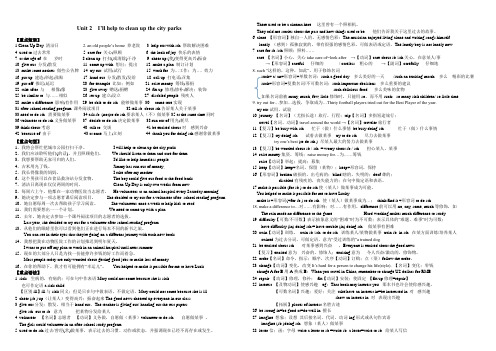
Unit 2 I’ll help to clean up the city parks【重点短语】1.Clean-Up Day 清洁日2. an old people’s home 养老院3. help out with sth. 帮助解决困难4. used to 过去常常......5. care for 关心;照顾6. the look of joy 快乐的表情7. at the age of 在......岁时8.clean up 打扫(或清除)干净9. cheer up (使)变得更高兴;振奋10. give out 分发;散发11. come up with 想出;提出12. make a plan 制订计划13. make some notices 做些公告牌14. try out 试用;试行15. work for 为…工作;为…. 效力16. put up 建造;举起;张贴17. hand out 分发;散发;发给18. call up 打电话;召集19. put off 推迟;延迟20. for example 比如;例如21. raise money 筹钱;募捐22. take after 与......相像;像23. give away 赠送;捐赠24. fix up 修理;修补;解决;装饰25. be similar to 与……相似26. set up 建立;设立27. disabled people 残疾人28. make a difference 影响;有作用29. be able to do sth. 能够做某事30. come true实现31.after-school reading program 课外阅读项目32.tell sb. about sth.告诉某人关于某事33.need to do sth. 需要做某事34.ask sb. (not)to do sth.要求某人(不)做某事35.at the same time同时36.volunteer to do sth.义务做某事37..decide to do sth.决定做某事38.run out of用光;耗尽39.think about考虑40. talk to 交谈41.be excited about对....感到兴奋42. because of 由于43.at once马上;立刻44. thank you for doing sth.感谢你做某事【重点句型】1、我将会帮忙把城市公园打扫干净。
人教版英语八年级下册Unit2单元短语句型归纳
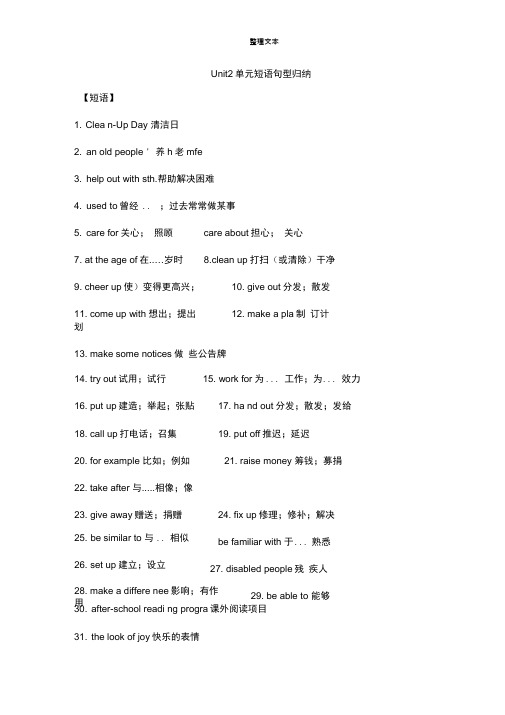
整理文本Unit2单元短语句型归纳【短语】1. Clea n-Up Day 清洁日2. an old people ' 养h 老mfe3. help out with sth.帮助解决困难4. used to 曾经 .. ;过去常常做某事5. care for 关心; 照顾care about 担心; 关心 7. at the age of 在..…岁时 8.clean up 打扫(或清除)干净9. cheer up 使)变得更高兴; 10. give out 分发;散发11. come up with 想出;提出12. make a pla 制 订计划13. make some notices 做 些公告牌30. after-school readi ng progra 课外阅读项目31. the look of joy 快乐的表情14. try out 试用;试行 16. put up 建造;举起;张贴18. call up 打电话;召集20. for example 比如;例如22. take after 与.....相像;像23. give away 赠送;捐赠 25. be similar to 与.. 相似 26. set up 建立;设立28. make a differe nee 影响;有作用 15. work for 为 ... 工作;为 ... 效力 17. ha nd out 分发;散发;发给 19. put off 推迟;延迟 21. raise money 筹钱;募捐 24. fix up 修理;修补;解决 be familiar with 于 ... 熟悉 27. disabled people 残 疾人 29. be able to 能够【典句必背】整理文本1. The boy could give out food at the food bank这个男孩可以在食品救济站分发食物。
2020人教版英语八年级下册单元知识点总结和同步练习 Unit-2(无答案)
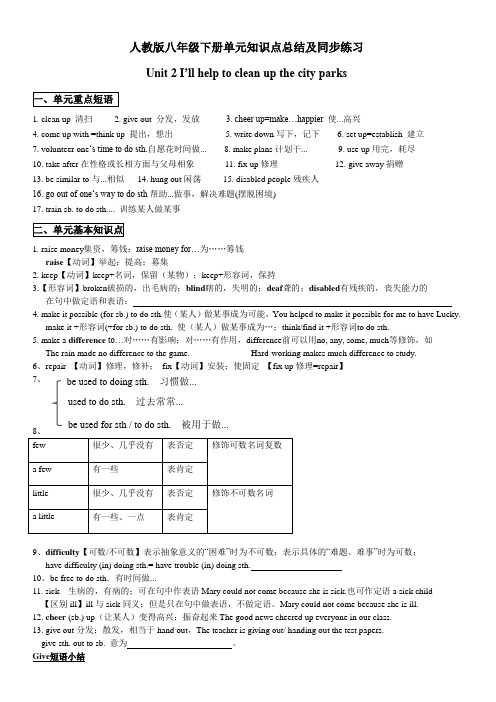
人教版八年级下册单元知识点总结及同步练习Unit 2 I’ll help to clean up the city parks1. clean up 清扫2. give out 分发,发放3. cheer up=make…happier 使...高兴4. come up with =think up 提出,想出5. write down写下,记下6. set up=establish 建立7. volunteer one‘s time to do sth.自愿花时间做... 8. make plans计划干... 9. use up用完,耗尽10. take after在性格或长相方面与父母相象11. fix up修理12. give away捐赠13. be similar to与...相似14. hung out闲荡15. disabled people残疾人16. go out of one‘s way to do sth帮助...做事,解决难题(摆脱困境)17. train sb. to do sth.... 训练某人做某事1. raise money集资,筹钱;raise money for…为……筹钱raise【动词】举起;提高;募集2. keep【动词】keep+名词,保留(某物);keep+形容词,保持3.【形容词】broken破损的,出毛病的;blind瞎的,失明的;deaf聋的;disabled有残疾的,丧失能力的在句中做定语和表语:4. make it possible (for sb.) to do sth.使(某人)做某事成为可能,You helped to make it possible for me to have Lucky.make it +形容词(+for sb.) to do sth. 使(某人)做某事成为…;think/find it +形容词to do sth.5. make a difference to…对……有影响;对……有作用,difference前可以用no, any, some, much等修饰,如The rain made no difference to the game. Hard-working makes much difference to study.修理=repair】9、difficulty【可数/不可数】表示抽象意义的“困难”时为不可数;表示具体的“难题、难事”时为可数;have difficulty (in) doing sth.= have trouble (in) doing sth.10、be free to do sth.有时间做...11. sick 生病的,有病的;可在句中作表语Mary could not come because she is sick.也可作定语a sick child【区别ill】ill与sick同义;但是只在句中做表语,不做定语。
- 1、下载文档前请自行甄别文档内容的完整性,平台不提供额外的编辑、内容补充、找答案等附加服务。
- 2、"仅部分预览"的文档,不可在线预览部分如存在完整性等问题,可反馈申请退款(可完整预览的文档不适用该条件!)。
- 3、如文档侵犯您的权益,请联系客服反馈,我们会尽快为您处理(人工客服工作时间:9:00-18:30)。
Unit 2 I’ll help to clean up the city parks.
一、重点短语归纳
Section A:
clean up打扫干净cheer up(使)变得更高兴give out分发
after-school study课外学习make a plan做一个计划come up with想出;提出help(sb.)out帮助某人摆脱困境put off推迟hand out分发
call up打电话给(某人);征召used to曾经……care for照顾;非常喜欢help others帮助他人give up放弃get better逐渐好转
by oneself独自at the age of在…岁时try out参加……选拔;试用at the same time同时at least至少be worried about担心…raise money筹钱 a dream come true梦想成真put up 张贴
old people’s home 养老院in one’s free time 在某人的空闲时间
Section B:
fix up修理;装饰run out of用完give away赠送;捐赠
take after(外貌或行为)像be similar to与…相像 a friend of mine我的一位朋友make a difference to对...有影响be excited about对...感到兴奋at once立刻;马上be good at擅长call in center呼叫中心set up 设立
二、重点词组用法归纳
Section A:
1、help to do sth.帮助做某事;有助于做某事
2、would like to do sth.想做某事
3、decide to do sth.决定做某事
4、volunteer to do sth. 自愿做某事
5、let sb. do sth .让某人做某事
6、
ask sb. to do sth. 要求某人做某事
7、
8、
few
很少 表否定 修饰可数名词复数 a few
少数 表肯定 little
一点 表否定 修饰不可数名词
a little 少量的 表肯定 Section B:
1、write a letter to sb .给某人写信
2、thank sb .for sth ./ doing sth .因…感谢某人
3、make it possible for sb .to do sth .使做某事对某人来说成为可能
4、have difficulty (in )doing sth .做某事有困难
5、be free to do sth .有时间做...
6、have difficulty (in) doing sth. 做某事有困难
三、语法重点
动词不定式的用法:
1、动词不定式作宾语
其后常接动词不定式作宾语的动词有:
Ex: She wanted to become a teacher . 她曾经想要成为一个老师。
be used to doing sth. 习惯做... used to do sth. 曾经...
2、动词不定式作状语,主要用来修饰动词,表示目的,结果或原因。
①作目的状语,动词不定式作目的状语,可以放在句首,一般用逗号隔开,
②作结果状语,常用在“too...to...”结构中
Ex: The boy is too young to look after himself. 这个男孩太小,还不能照顾自己。
③作原因状语,常跟在作表语的形容词后
Ex: I’m glad t o see you. 我很高兴见到你。
3、动词不定式作宾语补足语
其后常接不定式作宾补的动词有:ask,tell,make,teach,wish,help,invite等。
Ex: She asked me to speak louder. 她让我讲大声点。
